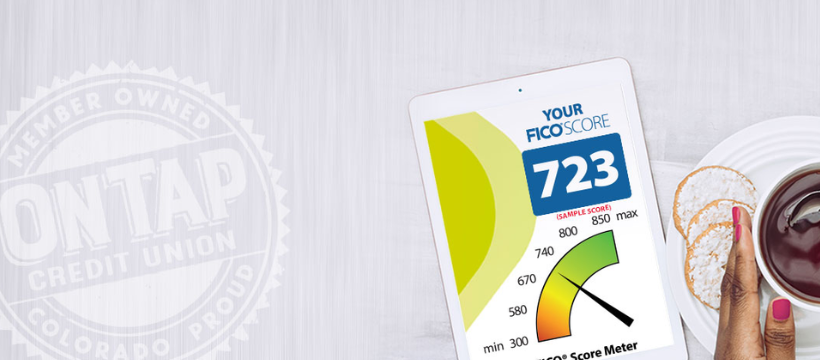

Understanding FICO® Scores
From TV ads to online offers,
we hear a lot about credit scores
Understanding what generates your score, and what your score means to your financial flexibility and future, can also help you take steps to improve your score and access better financial options. The credit scores most widely used in lending decisions are FICO® scores, and are provided through the three major consumer reporting agencies (Equifax, Experian and TransUnion).
Lenders use FICO® scores to help them
make billions of credit decisions every year
Understanding your FICO® score can help you better understand your credit risk and allow you to more responsibly manage your financial health. Higher scores demonstrate lower credit risks to lenders.
As with many lenders, On Tap Credit Union relies on FICO® scores for our home, auto, and other lending decisions. For example, our financial advocates will, with your permission, pull your score to tell you what loans rates and terms you may qualify for.
On Tap Credit Union and Fair Isaac are not credit repair organizations as defined under federal or state law, including the Credit Repair Organizations Act. On Tap Credit Union and Fair Isaac do not provide "credit repair" services or advice or assistance regarding "rebuilding" or "improving" your credit record, credit history or credit rating.
FICO is a registered trademark of Fair Isaac Corporation in the United States and other countries.
Frequently Asked Questions
What Are FICO® Scores?
FICO® scores are the most widely used credit scores. Each FICO® score is a three-digit number calculated from the data on your credit reports at the three major consumer reporting agencies—Experian, TransUnion and Equifax. Your FICO® scores predict how likely you are to pay back a credit obligation as agreed. Lenders use FICO® scores to help them quickly, consistently and objectively evaluate potential borrowers’ credit risk.
What does FICO® mean?
The FICO® score was created by the Fair Isaac Corporation, and is an acronym built from the corporation name.
What goes into FICO® scores?
FICO® scores are calculated from the credit data in your credit report. This data is grouped into five categories; below is a detailed breakdown of the relative importance of each category. As you review this information, keep in mind that:
1. FICO® scores take into consideration all of these categories, not just one or two. The importance of any factor (piece of information) depends on the information in your entire credit report.
2. FICO® scores look only at the credit-related information on a credit report.
3. FICO® scores consider both positive and negative information on a credit report.
Why do FICO® scores Fluctuate or change?
There are many reasons why a score may change. FICO® scores are calculated each time they are requested, taking into consideration the information that is in your credit file from a consumer reporting agency at that time. So, as the information in your credit file at that CRA changes, FICO® scores can also change. Review your key score factors, which explain what factors from your credit report most affected a score. Comparing key score factors from the two different time periods can help identify causes for a change in a FICO® score. Keep in mind that certain events such as delinquent payments or bankruptcy can lower FICO® scores quickly.
What is a credit score?
A credit score is a number summarizing your credit risk, based on your credit data. A credit score helps lenders evaluate your credit profile and influences the credit that’s available to you, including loan and credit card approvals, interest rates, credit limits and more.
How can I find out what my FICO® score is?
FICO® scores are based on credit file data from a consumer reporting agency, so differences in your credit files may create differences in your FICO® Scores. You can request a your credit score from the three CRAs – Equifax, Experian and TransUnion, though there may be a cost involved.
